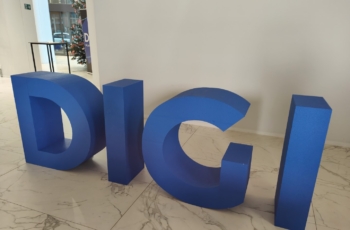Digi Belgium officially joins the Belgian telecommunications market. The fourth national telecommunications provider aims for low prices. Is that enough to question established values?
“Welcome to Digi’s summer event,” jokes Jeroen Degadt, General Manager of Digi Belgium, during his welcome speech. Digi would have liked to launch its offer in the summer, but in the end this only happened shortly before Christmas. The celebrations are not getting any smaller: Guests of honor at the press conference are Mitch De Geest, CEO of Citymesh, and Valentin Popoviciu, who is present on behalf of the Romanian parent company.
“This is an important milestone for Digi Communications. Wherever we operate in Europe, we are a challenger on the market,” says Valentin Popoviciu. The Romanian telecommunications company has already been active in its home countries of Spain, Italy and Portugal and is now officially entering Belgium. Digi is not doing this to play an additional role: it is promoting itself as the “fourth national telecommunications operator” and wants to gain a foothold alongside Proximus, Telenet and Orange. What can we expect from this newcomer?
Belgian-Romanian tandem
Digi’s entry into the Belgian telecommunications market is thanks to Citymesh, a provider of wireless networking applications for businesses. Citymesh pulled off a surprise in 2022 by acquiring nationwide spectrum as part of the 5G security push. The company from Oostkamp quickly developed into one of the major players on the Belgian telecommunications market.
As a co-inspirer of the project, De Geest cannot be missed at the press conference. “About twenty years ago I started a company with some friends. This company has now become one of the largest wireless connectivity operators in Belgium. We are now joining forces with Digi to better serve the consumer market.”
The division of tasks is clearly defined. Digi will offer telecommunications services for consumers, while Citymesh will focus on enterprises. By working with Citymesh, Digi’s integration will be smoother.
Thanks to the spectrum that Citymesh has, it doesn’t have to rely on competitors to surf their network. In the early days, Digi is still dependent on Proximus’ infrastructure, but will build its own network in the long term. This allows him to make a name for himself as a fully-fledged fourth national player. Digi also wants to control the fiber optic network as much as possible. “This is necessary to keep our prices low,” agrees Degadt.
Price war
The brand new telecom operator knows which nerve to hit. “Our mission is to make telecommunications affordable again,” says Degadt. It has been known for some time that telecommunications prices in Belgium are high. In comparative studies, Belgium rarely turns out to be a cheap country, both on a European and global scale.
Popoviciu cites a lack of competition as an explanatory factor. He displays a graphic to illustrate his point. “In countries where at least four operators are active, telecommunications prices are on average more than fifty percent lower.” Popoviciu likes to draw a comparison with his home country Romania, which is one of the five cheapest countries in the world for telecommunications.
Digi wants to take on the role of price breaker in Belgium. Degadt is ready for the long-awaited offer and pricing reveal. The mobile phone offer is very simple to begin with: Digi offers a bundle with 15 GB of mobile data for five euros per month. “With us you don’t have to worry about the selection,” jokes Degadt. “But we don’t just want to be cheap, we also want to offer consumers more at favorable conditions.”
Accelerate the fiber
This line is drawn to fixed-line internet, where Digi has three formulas on offer, ranging from ten to twenty euros and promising speeds of up to 10 Gbit/s. Degadt gives its competitors a proverbial kick in the ass. “Fiber optics in Belgium have a coverage rate of thirty percent. In other countries the rollout is happening much faster.”
Digi will lay as much fiber as possible itself. It starts on a fairly modest scale in Brussels and then spreads to other cities. “Activating the network only takes a few days. We hope to have connected two million families to the fiber optic connection within five years.” Degadt cannot yet reveal when Digi will arrive on your street.
To reach the more remote Belgian communities, Digi extends a cautious hand to the competition. De Geest: “I think it makes sense as an industry to look at how we can drive adoption and make fair agreements around access. This not only reduces the cost of providing fiber cost-effectively, but also reduces inconvenience for residents as the road only needs to be opened once. If that doesn’t work, we’ll do it ourselves, but it will take longer.”
Bat in the chicken coop
Can Digi shake up the Belgian telecommunications market? At the start, the company sounds ambitious but also cautious at the same time. “In the coming period we will first have to wait and see how the market reacts. We will continue to expand our offering step by step,” says Popoviciu.
The ever-ambitious De Geest is also aware that established values cannot simply be displaced by a newcomer. “We are at the beginning of a long-term game. In the long term we want to capture a reasonable market share, but the market is what it is. That’s why we proceed cautiously when setting goals. But if I didn’t believe it was possible, I wouldn’t have even started.
It’s hard to deny that Digi starts with a disadvantage. This is made clear by the fact that the operator cannot yet offer its own 5G services at the start. Digi has also not yet fully started rolling out fiber, while Proximus has been working on it for several years. Given the many millions of euros that fiber optics have already cost operators, the question arises to what extent Digi can keep its low price promise, even if Degadt promises that Digi will not be guilty of continuous price increases.
However, the established values in the Belgian telecommunications market will not be happy with the entry of a new player. With major investments now required in fiber and 5G, the last thing operators want is a price war. With low prices, Digi may still be able to win souls quickly. The bat was thrown into the forest.
With major investments now required in fiber and 5G, the last thing operators want is a price war.

























